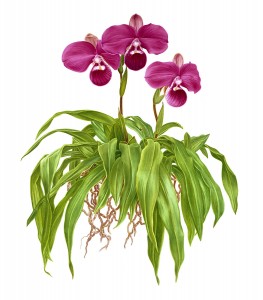How a Constricted Market Set Almost Lead to the Extinction of a Rare Peruvian Orchid
In the 19th century, orchid collecting and cultivation was a very popular hobby among the extremely wealthy, many of members of British royalties owned private greenhouses with millions of unique species taken from the mountains of Borneo and Papua New Guinea. In those times the discovery of new orchid species regularly made headline news in the major British newspapers and exorbitant prices were paid for the most prized specimens. As the demand for orchids increased, wealthy orchid growers began funding trips to distant regions in search of new and bizarre species. The hunters who led these trips were incredibly cutthroat and ruthless, “A well known hunter, William Arnold, once pulled a gun on a rival and almost came to a shootout on a ship heading to Venezuela. Arnold was later instructed by his employer to follow the man to collect the same type of orchids he did and urinate on the other man’s specimens to destroy them.” (Amelinckx) Needless to say, many wild orchid populations were decimated from poaching and deliberate burnings that were meant prevent any other hunters from collecting the same plants. In those days, no one would bat an eye at such atrocities. Today, we like to think of our society as more ecologically and environmentally conscious, but this is not always the case.
In 2002, an orchid taxonomist and enthusiast, James Michael Kovach, traveled to Peru in search of new species of orchids in the Phragmipedium genus. While exploring the jungles near San Martin, he made a startling discovery. A fantastic new species of Phragmipedium with flowers that were well over 15cm wide and a striking pinkish red coloration never seen before in the Schluckebieria complex of Phragmipedium. This new species, now classified as Phragmipedium kovachii, was an incredibly important discovery because it was so morphologically unique and had huge potential in contributing to Phragmipedium hybridization and propagation. This value was quickly realized by the Convention on International Trade in Endangered Species (CITES) and huge fines were quickly put in place on any exportation of the plant to prevent the poaching of this highly vulnerable and endemic species. However, this quickly backfired because the value of the plant skyrocketed. Black market specimens were being sold for upwards of 25,000 dollars and soon thousands of plants were being ripped from the wild by poachers who had no regard for the laws or fines set in place by CITES.

Phragmipedium kovachii
This happened because those fines only prevented the ecologically responsible nurseries in Peru, The United States and Europe from being able to propagate the plant responsibly. The fines put in place by CITES merely made it much harder to acquire and thus much more valuable. This made an incredibly constricted set of sellers, comprised entirely of black market poachers who have no regard for the law anyways. If CITES had encouraged responsible horticulturists to collect and propagate Phragmipedium kovachii, they would have been able to quickly propagate the plant and flood the market quickly. Subsequently dropping the value of the plant, removing any incentive for these poachers to collect the plant. Fortunately, CITES quickly realized this and gave several Peruvian nurseries permission to collect seed for mass production. Since then, the value of Phragmipedium kovachii has in fact quickly diminished and the pressure on wild populations was reduced. Nonetheless, this is an incredible example of how much of an effect a constricted set in a market can have. This huge difference in supply vs. demand almost lead to the extinction of the arguably most important orchid discovery of the 21st century.
Sources:
Old Time Farm Crime: The Cutthroat World of Victorian Orchid Hunters
https://sites.utexas.edu/wildlife/2014/10/07/the-phragmipedium-kovachii-is-cites-guilty-of-over-criminalization/
Photo Source:
https://www.mnh.si.edu/exhibits/losing_paradise/PhragmipediumKovachii.html
